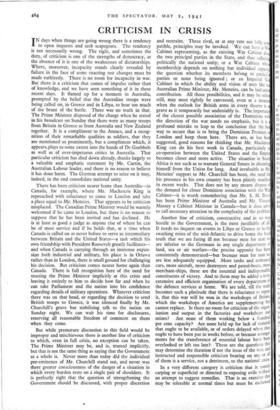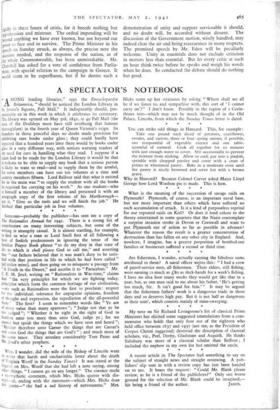CRITICISM IN CRISIS
Idays when things are going wrong there is a tendency 1 to open inquests and seek scapegoats. The tendency is not necessarily wrong. The right, and sometimes the duty, of criticism is one of the strengths of democracy, as the absence of it is one of the weaknesses of dictatorships. Where, moreover, incapacity stands clearly revealed by failure in the face of some exacting test changes must be made ruthlessly. There is no room for incapacity in war. But there is a criticism that comes of impulse rather than of knowledge, and we have seen something of it in these recent days. It flamed up for a moment in Australia, prompted by the belief that the Australian troops were being called on, in Greece and in Libya, to bear too much of the brunt of the battle. There was no truth in that. The Prime Minister disposed of the charge when he stated in his broadcast on Sunday that there were as many troops from Britain in Greece as from Australia and New Zealand together. It is a compliment to the Anzacs, and a recog- nition of their remarkable qualities as soldiers, that they are mentioned so prominently, but a compliment which, it appears, plays to some extent into the hands of Dr.Goebbels as well as of over-impetuous critics in Australia. That particular criticism has died down already, thanks largely to a valuable and emphatic statement by Mr. Curtin, the Australian Labour leader, and there is no reason to believe it has done harm. The German attempt to seize on it may, indeed, in the end consolidate national unity.
There has been criticism nearer home than Australia—in Canada, for example, where Mr. Mackenzie King is reproached with reluctance to come to London and take a place equal to Mr. Menzies. That appears to be criticism misplaced. The Canadian Prime Minister would be warmly welcomed if he came to London, but there is no reason to suppose that he has been invited and has declined. He is at least as good a judge as anyone else of where he can be of most service and if he holds that, at a time when Canada is called on as never before to serve as intermediary between Britain and the United States—a task which his own friendship with President Roosevelt greatly facilitates— and when Canada is carrying through an immense expan- sion both industrial and military, his place is in Ottawa rather than in London, there is small ground for challenging his decision. But criticism comes nearer home again than Canada. There is full recognition here of the need for trusting the Prime Minister implicitly at this crisis and leaving it entirely to him to decide how far and when he can take Parliament and the nation into his confidence regarding details of military operations. Whatever criticism there was on that head, or regarding the decision to send British troops to Greece, it was silenced finally by Mr. Churchill's grave but stabilising talk to the nation on Sunday night. We can wait his time for disclosures, reserving all reasonable freedom of comment on them when they come.
But while premature discussion in this field would be improper and mischievous there is another line of criticism to which, even in full crisis, no exception can be taken. The Prime Minister may be, and is, trusted implicitly, but that is not the same thing as saying that the Government as a whole is. Never more than today did the individual pre-eminence of Mr. Churchill stand out, and never was there greater consciousness of the danger of a. situation in which every burden rests on a single pair of shoulders. It is perfectly right that the question of strengthening the Government should be discussed, with proper discretion and restraint. Three rival, or at any rate not fully co patible, principles may be invoked. We can have a V' Cabinet representing, as the existing War Cabinet do the two principal parties in the State, and thus reflecti politically the national unity; or a War Cabinet whr membership depends on nothing but individual capa,..:\ the question whether its members belong to particu parties or none being ignored ; or an Imperial X,' Cabinet in which the ability and vision of men like :a Australian Prime Minister, Mr. Menzies, can be laid undo contribution. All those possibilities, and it may be othe still, may most rightly be canvassed, even at a momen when the outlook for British arms in every theatre is grave as it temporarily but undeniably is. The importanc of the closest possible association of the Dominions wi the direction of the war needs no emphasis, but it is profound mistake to leap to the conclusion that the bes way to secure that is to bring the Dominion Premiers t London and keep them here. There are, as has bee suggested, good reasons for thinking that Mr. Mackenzi King can do his best work in Canada, particularly a co-operation between the United States and the Empir becomes closer and more active. The situation in Soul Africa is not such as to warrant General Smuts in absentin himself from the Union for long. And invaluable as Mr Menzies' support to Mr. Churchill has been, the need fo his presence in his own country has been plainly manifes in recent weeks. That does not by any means dispose the demand for closer Dominion association with the \X' Cabinet—it is worth remembering that Mr. S. M. Bruc has been Prime Minister of Australia and Mr. Vincen Massey a Cabinet Minister in Canada—but it does sell to call necessary attention to the complexity of the problem.
Another line of criticism, constructive and in no wad hostile to the Government, is the most justifiable of all It needs no inquest on events in Libya or Greece or in the swathing mists of the mid-Atlantic to drive home the hard truth that we are faring ill not because man for man we are inferior to the Germans in any single department of land, sea or air warfare—the precise opposite has been consistently demonstrated—but because man for man we are less adequately equipped. More tanks and armoured cars, more aircraft, more destroyers and patrol-boats, more merchant-ships, these are the essential and indispensable constituents of victory. And to them may be added a mare extensive and efficient organisation of every department of the defence services at home. We are told, till the truth becomes such a platitude that there is reluctance to repeat it, that this war will be won in the workshops of Britain, which the workshops of America are supplementing but cannot replace. Is there no room for criticism of the organ- isation and output in the factories and workshops and mines? Are none of them working below a hundred per cent. capacity? Are none held up for lack of material that ought to be available, or of orders delayed when they ought to have been put in weeks before, or because arrange- ments for the transference of essential labour have been overlooked or left too late? These are the questions that may determine the duration if not the issue of the war, and instructed and responsible criticism bearing on any or all of them is a service, not a detriment, to the national cause.
In a very different category is criticism that is merely carping or superficial or directed to exposing evils without an attempt to suggest remedies. That is an exercise that may be tolerable at normal times but must be eschewed rigidly in these hours of crisis, for it breeds nothing but apprehension and mistrust. The ordeal impending will be beyond anything we have ever known, but not beyond our power to face and to survive. The Prime Minister in his speech on Sunday struck, as always, the precise note the occasion needed, and the response of the nation, as of the whole Commonwealth, has been unmistakable. Mr. Churchill has asked for a vote of confidence from Parlia- ment, with special relation to the campaign in Greece. It would seem to be superfluous, but if he deems such a demonstration of unity and support serviceable it should, and no doubt will, be accorded without dissent. The discussion of the Government motion, wisely handled, may indeed clear the air and bring reassurance in many respects. The promised speech by Mr. Eden will be peculiarly welcome. Unity in essentials does not exclude criticism in matters less than essential. But let every critic at such an hour think twice before he speaks and weigh his words when he does. So conducted the debate should do nothing but good.































 Previous page
Previous page